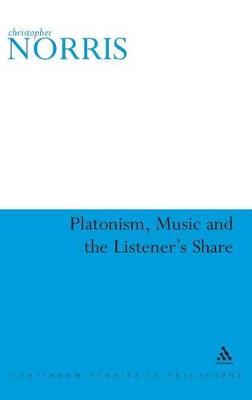Continuum Studies in Philosophy
2 total works
Christopher Norris argues for and constructs a new approach to philosophy of mind that combines naturalistic and rationalist perspectives usually thought to be at odds. "Re-Thinking the Cogito" seeks to combine a strongly naturalistic with a distinctively rationalist perspective on some nowadays much-discussed issues in philosophy of mind. Against the common view that they involve downright incompatible conceptions of mind, knowledge and ethics it seeks to unite a naturalism that draws on recent advances in neurophysiology and cognitive science with an outlook that gives full weight to those normative values at the heart of rationalist thought. True to the book's constructive spirit, Norris offers various detailed proposals for bringing the two approaches into a mutually enhancing - though also mutually provocative - relationship. He finds that claim strikingly prefigured in Spinoza's working-out of a non-reductive yet metaphysically uncompromising mind/body monism. Moreover he suggests how a thoroughly naturalised approach might yet become a locus of productive engagement with the work of an ultra-rationalist thinker such as Alain Badiou.
Thus Norris puts the case that physically embodied human thought has cognitive, intellectual and creative powers that cannot and need not be accounted for in terms of conscious (let alone self-conscious) reflection. "Continuum Studies in Philosophy" presents cutting-edge scholarship in all the major areas of research and study. The wholly original arguments, perspectives and research findings in titles in this series make it an important and stimulating resource for students and academics from a range of disciplines across the humanities and social sciences.
Thus Norris puts the case that physically embodied human thought has cognitive, intellectual and creative powers that cannot and need not be accounted for in terms of conscious (let alone self-conscious) reflection. "Continuum Studies in Philosophy" presents cutting-edge scholarship in all the major areas of research and study. The wholly original arguments, perspectives and research findings in titles in this series make it an important and stimulating resource for students and academics from a range of disciplines across the humanities and social sciences.
What is a musical work? What are its identity-conditions and the standards (if any) that they set for a competent, intelligent, and musically perceptive act of performance or audition? Should the work-concept henceforth be dissolved as some New Musicologists would have it into the various, everchanging socio-cultural or ideological contexts that make up its reception-history to date? Can music be thought of as possessing certain attributes, structural features, or intrinsically valuable qualities that are response-transcendent, i.e., that might always elude or surpass the best state of (current or future) informed opinion? These are some of the questions that Christopher Norris addresses by way of a sustained critical engagement with the New Musicology and other debates in recent philosophy of music. His book puts the case for a qualified Platonist approach that would respect the relative autonomy of musical works as objects of more or less adequate understanding, appreciation, and evaluative judgement.
At the same time this approach would leave room for listeners share the phenomenology of musical experience in so far as those works necessarily depend for their repeated realisation from one performance or audition to the next upon certain subjectively salient modalities of human perceptual and cognitive response. Norris argues for a more philosophically and musically informed treatment of these issues that combines the best insights of the analytic and the continental traditions. Perhaps the most distinctive feature of Norris's book, true to this dual orientation, is its way of raising such issues through a constant appeal to the vivid actuality of music as a challenge to philosophic thought. This is a fascinating study of musical understanding from one of the worlds leading contemporary theorists.
At the same time this approach would leave room for listeners share the phenomenology of musical experience in so far as those works necessarily depend for their repeated realisation from one performance or audition to the next upon certain subjectively salient modalities of human perceptual and cognitive response. Norris argues for a more philosophically and musically informed treatment of these issues that combines the best insights of the analytic and the continental traditions. Perhaps the most distinctive feature of Norris's book, true to this dual orientation, is its way of raising such issues through a constant appeal to the vivid actuality of music as a challenge to philosophic thought. This is a fascinating study of musical understanding from one of the worlds leading contemporary theorists.

